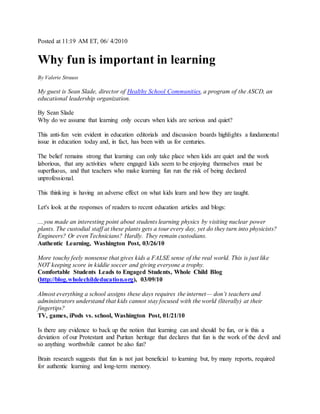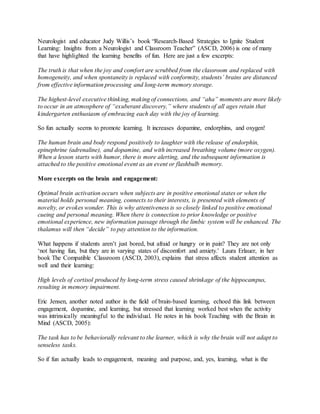Is learning fun
- 1. Posted at 11:19 AM ET, 06/ 4/2010 Why fun is important in learning By Valerie Strauss My guest is Sean Slade, director of Healthy School Communities, a program of the ASCD, an educational leadership organization. By Sean Slade Why do we assume that learning only occurs when kids are serious and quiet? This anti-fun vein evident in education editorials and discussion boards highlights a fundamental issue in education today and, in fact, has been with us for centuries. The belief remains strong that learning can only take place when kids are quiet and the work laborious, that any activities where engaged kids seem to be enjoying themselves must be superfluous, and that teachers who make learning fun run the risk of being declared unprofessional. This thinking is having an adverse effect on what kids learn and how they are taught. Let's look at the responses of readers to recent education articles and blogs: ....you made an interesting point about students learning physics by visiting nuclear power plants. The custodial staff at these plants gets a tour every day, yet do they turn into physicists? Engineers? Or even Technicians? Hardly. They remain custodians. Authentic Learning, Washington Post, 03/26/10 More touchy feely nonsense that gives kids a FALSE sense of the real world. This is just like NOT keeping score in kiddie soccer and giving everyone a trophy. Comfortable Students Leads to Engaged Students, Whole Child Blog (http://blog.wholechildeducation.org), 03/09/10 Almost everything a school assigns these days requires the internetâ donât teachers and administrators understand that kids cannot stay focused with the world (literally) at their fingertips? TV, games, iPods vs. school, Washington Post, 01/21/10 Is there any evidence to back up the notion that learning can and should be fun, or is this a deviation of our Protestant and Puritan heritage that declares that fun is the work of the devil and so anything worthwhile cannot be also fun? Brain research suggests that fun is not just beneficial to learning but, by many reports, required for authentic learning and long-term memory.
- 2. Neurologist and educator Judy Willisâs book âResearch-Based Strategies to Ignite Student Learning: Insights from a Neurologist and Classroom Teacherâ (ASCD, 2006) is one of many that have highlighted the learning benefits of fun. Here are just a few excerpts: The truth is that when the joy and comfort are scrubbed from the classroom and replaced with homogeneity, and when spontaneity is replaced with conformity, studentsâ brains are distanced from effective information processing and long-term memory storage. The highest-level executive thinking, making of connections, and âahaâ moments are more likely to occur in an atmosphere of âexuberant discovery,â where students of all ages retain that kindergarten enthusiasm of embracing each day with the joy of learning. So fun actually seems to promote learning. It increases dopamine, endorphins, and oxygen! The human brain and body respond positively to laughter with the release of endorphin, epinephrine (adrenaline), and dopamine, and with increased breathing volume (more oxygen). When a lesson starts with humor, there is more alerting, and the subsequent information is attached to the positive emotional event as an event or flashbulb memory. More excerpts on the brain and engagement: Optimal brain activation occurs when subjects are in positive emotional states or when the material holds personal meaning, connects to their interests, is presented with elements of novelty, or evokes wonder. This is why attentiveness is so closely linked to positive emotional cueing and personal meaning. When there is connection to prior knowledge or positive emotional experience, new information passage through the limbic system will be enhanced. The thalamus will then âdecideâ to pay attention to the information. What happens if students arenât just bored, but afraid or hungry or in pain? They are not only ânot having fun, but they are in varying states of discomfort and anxiety.' Laura Erlauer, in her book The Compatible Classroom (ASCD, 2003), explains that stress affects student attention as well and their learning: High levels of cortisol produced by long-term stress caused shrinkage of the hippocampus, resulting in memory impairment. Eric Jensen, another noted author in the field of brain-based learning, echoed this link between engagement, dopamine, and learning, but stressed that learning worked best when the activity was intrinsically meaningful to the individual. He notes in his book Teaching with the Brain in Mind (ASCD, 2005): The task has to be behaviorally relevant to the learner, which is why the brain will not adapt to senseless tasks. So if fun actually leads to engagement, meaning and purpose, and, yes, learning, what is the
- 3. answer for education? Should we create courses based only around what is deemed enjoyable by todayâs generation? No, but we should look at the process of how current courses are taught and delivered. Ultimately, we should resist the knee-jerk urge to declare something that is fun to be educationally inferior. Fun means engagement, doing and learning what has meaning and purpose, and it means being challenged. Embracing this belief should have a profound effect on what and how we teach. Follow my blog all day, every day by bookmarking washingtonpost.com/answersheet. And for admissions advice, college news and links to campus papers, please check out our new Higher Education page at washingtonpost.com/higher-ed Bookmark it! By Valerie Strauss | June 4, 2010; 11:19 AM ET Categories: Learning | Tags: ascd, engaging students, fun in education, healthy classrooms, healthy school communitiesy, learning, theory of learning



